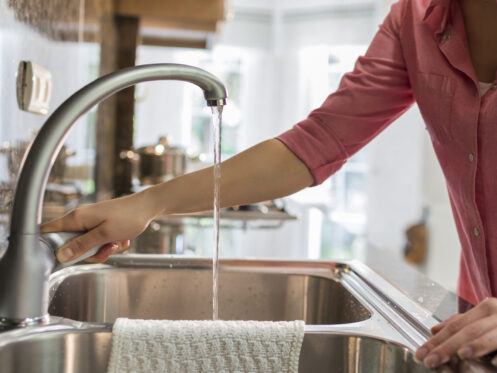Water is a precious resource that we often take for granted, yet its scarcity is becoming a global concern. Conserving water isn’t just a responsible choice but also a way to reduce utility bills and contribute to a more sustainable future. Making small changes in your daily routine can have a significant effect on water conservation. Let’s explore 20 effective ways to conserve water usage in your home.
1. Fix Leaks Promptly
Leaky faucets, toilets, and pipes might seem like minor annoyances, but they can waste a surprising amount of water over time, reportedly up to 100 gallons of water annually. Regularly inspect your plumbing fixtures for leaks and repair them promptly to prevent unnecessary water loss.
2. Install Water-Efficient Fixtures
Consider replacing old, water-guzzling fixtures with water-efficient ones. Low-flow faucets, showerheads, and toilets use less water without compromising functionality. These fixtures are designed to maintain a strong water pressure while consuming significantly less water, helping you conserve without sacrificing comfort.
3. Embrace Shorter Showers
Long, leisurely showers are enjoyable, but they consume a substantial amount of water. Consider cutting down your shower time by just a few minutes. A shorter shower not only conserves water but also saves energy that is used to heat the water.
4. Collect Rainwater
If you’re fortunate enough to have outdoor space, consider setting up a rainwater collection system. Rainwater can be used for watering plants and gardens, and even for cleaning purposes. This reduces the demand on your municipal water supply, especially during dry periods.
5. Opt for Full Loads
Whether you’re using a dishwasher or a washing machine, make sure to run full loads. These appliances use the same amount of water regardless of the load size, so maximizing their capacity minimizes water waste. If your dishwasher has an eco mode, use it to further reduce water consumption.
6. Be Mindful of Lawn Care
A healthy thriving lawn needs a substantial amount of water. Consider xeriscaping or choosing native plants that require less water. If you must water your lawn, do it during the cooler parts of the day to minimize evaporation.
7. Reuse Water When Possible
Water doesn’t always have to go to waste after its first use. For instance, the water you use to rinse fruits and vegetables can be collected and used to water plants. You can also save the water from cooking pasta or boiling eggs to water outdoor plants once it cools down.
8. Insulate Your Pipes
Insulating hot water pipes not only reduces heat loss but also cuts down the time it takes for hot water to reach your fixtures. This means less water running down the drain as you wait for hot water to arrive. Additionally, insulating cold water pipes prevents condensation and potential moisture-related issues.
9. Mulch Your Garden
Applying mulch to your garden beds helps retain soil moisture, reducing the need for frequent watering. Mulch acts as a protective barrier, preventing water from evaporating and keeping the soil cooler. This allows plants to thrive while using less water.
10. Educate Your Household
Water conservation is a collective effort. Teach your family members about the importance of conserving water and how simple changes in their habits can make a significant difference. Encourage them to turn off the tap while brushing their teeth, fix leaks they come across, and avoid leaving water running unnecessarily.
11. Utilize Smart Water Meters
Smart water meters are advanced devices that provide detailed insights into your water usage. They can be connected to your smartphone or computer, allowing you to monitor your water consumption on a daily or even hourly basis. By keeping track of your usage patterns, you can identify any sudden spikes in consumption and address them promptly.
12. Install Leak Detection Systems
Smart leak detection systems use sensors to monitor water flow and pressure in your plumbing system. These sensors can alert you in real time if there’s an abnormal water flow, indicating a potential leak. This proactive approach not only saves water but also prevents costly damage to your home.
13. Set Up Irrigation Controllers
If you have a garden or lawn that requires irrigation, consider installing a smart irrigation controller. These devices take into account weather conditions and soil moisture levels to determine the optimal amount of water needed for your plants. This ensures that you’re not overwatering your landscape, thus conserving water while keeping your greenery healthy.
14. Use Water-Tracking Apps
Numerous smartphone apps are designed to help you track your daily water consumption. These apps often provide water-saving tips, personalized recommendations, and even gamification elements to encourage more mindful water use. By involving the whole family, these apps can turn water conservation into a fun and engaging activity.
15. Implement Home Automation Systems
Home automation systems can integrate various aspects of your home, including water usage. These systems allow you to remotely control appliances like washing machines and dishwashers, ensuring they run during off-peak hours when water demand is lower. Some systems can even adjust your thermostat to help save energy, indirectly reducing your water consumption.
16. Participate in Community Programs
Many communities organize water conservation programs, workshops, and events. These initiatives often provide valuable information, tips, and resources to help you better understand water conservation practices. By attending these events, you can gather knowledge and connect with like-minded individuals who share your passion for sustainability.
17. Advocate for Water Conservation
Raise awareness about the importance of water conservation by engaging in discussions with friends, family, and neighbors. Use social media platforms or local community forums to share informative articles, tips, and success stories related to water-saving efforts. Encourage others to join the cause and amplify the message of responsible water usage.
18. Collaborate with Local Organizations
Connect with local environmental organizations, gardening clubs, and schools to collaborate on water conservation projects. Together, you can organize initiatives such as community clean-ups, tree planting, and workshops on drought-resistant gardening. These collective efforts can have a significant positive impact on your local ecosystem.
19. Support Policy Changes
Advocate for water-conscious policies in your community and beyond. Participate in town hall meetings, write letters to local government officials, and support initiatives that promote water efficiency and conservation. Your voice can contribute to the development of regulations that encourage responsible water usage on a larger scale.
20. Educate the Next Generation
Engage with schools and educational institutions to promote water conservation among students. Collaborate with teachers to incorporate water-saving topics into the curriculum. By educating young minds about the importance of water preservation, you’re ensuring that the next generation will grow up with a deep-rooted understanding of the value of water.
Conserve Water Like a Pro Today!
Conserving water in your home is a commitment to a more sustainable future and a responsible way to manage a precious resource. By implementing these ten practical strategies, you can significantly reduce your household’s water usage without sacrificing comfort. From fixing leaks to reusing water and embracing water-efficient fixtures, every small action contributes to the larger goal of preserving our planet’s water supply for generations to come. So, let’s take action today and be mindful of our water consumption to create a better tomorrow. Looking for water heater service? Contact us!
To find more long-term high-yield solutions for water conservation, contact Meade’s Heating and Air today to learn more about how we can help you!




